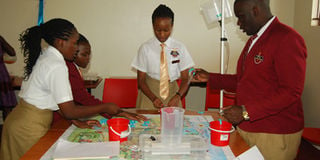Mentoring girls in science vital

Students of Viva College, Jinja during a science experiment. Initiatives such as Science, Technology, Engineering and Mathematics, are aiming at boosting the involvement of girls in science courses.
What you need to know:
The government has in the recent past embarked on drives to make science-related courses popular among students. But it is important to note that girls continue to lag behind. Initiatives such as Science, Technology, Engineering and Mathematics, however, are trying to see that that gap is closed.
The National Science Foundation, an American government agency, noted that, “in the 21 Century, scientific and technological innovations have become increasingly important as we face the benefits and challenges of both globalisation and a knowledge-based economy.
To succeed in this new information-based and highly technological society, students need to develop their abilities in Science, Technology, Engineering and Mathematics (Stem) to levels much beyond what was considered acceptable in the past.” This week, Uganda held the Africa Science Week for the very first time in the spirit of encouraging professionals in Stem, but also inspire young people, especially girls to join this field.
Sharifah Nabulya is a Senior Two student at Kololo Secondary School aspiring to become a mechanical engineer. However, she still has many unanswered questions about the field.
“Though I have heard about Stem and the need for more students to enter into that field, I have never understood why this is so important. I also do not understand how all these fields work together or how related they are in practice,” she confided while attending the Africa Science Week.
Additionally, Nabulya thinks that for one to join any field in Stem, they should be very intelligent and best performers in science subjects something she worries might scare away many students who would have loved to pursue a career in the same.
Why Stem?
Aida Bukubuze, the founder of AYDIA Technology Consults Uganda and an expert in information Systems and Marketing IT solutions, noted that Stem should not be looked at as this big and very technical thing, but as simple as it really is.
“When you for example ask someone whether they like sciences, they will probably tell you no.
Actually, when you ask them if they would like to do something in the field of Stem, they tell you, ‘no, I want to be a writer.’ But when we talk about technology for example, it is something that cuts across every field,” she says. She also adds that even if someone is in a field outside Stem, it is still possible for them to introduce it. “Technology is all around us.
The way we communicate is through the use of technology – using different gadgets, the way we transact through the use of mobile money is technology. Even when you order a boda boda using any of the available applications, all that is technology. It cuts across all genders and all professional fields,” Bukubuze says.
Available opportunities
In order to empower, inspire and train the next generation of girls and young women, Women in Technology Uganda (WitU), a tech-focused organisation gives opportunity to girls interested in their programmes to volunteer and start clubs in their local communities for primary school pupils, secondary school students and local universities. Through volunteering two hours a week for eight weeks, one is exposed to various skills in technology.
Furthermore, they have also launched Code Girls clubs in so far 10 schools to help girls gain exposure to ICT education. WitU also offers a three months career and leadership and life skills training in Stem entrepreneurship, leadership and life skills.
“Furthermore, for any girl and woman interested in coding, coding in heels has the opportunity. These are a programme built to close the gender digital divide by attracting girls and women who have interest in technology and provide them with free digital skills and computer software development training by taking them through a four months project based Tech and software bootcamp,” Angella Mirembe Ssemwogerere, the founder explains.
The numbers
Of the 99,982 candidates that sat UACE in 2017, 41,521 were female and 58,461 male. Uneb statistics further indicate that; 99.3 per cent of the females (41,257) passed compared to 98.6 per cent (58,461) males. However, performance was better in Literature in English – 80.2 per cent, Islam 80 per cent, GP 78.7 per cent and Art 77.1 per cent.
This was attributed to the fact that female entries in Mathematics and the Sciences were much lower than that of the males, the executive secretary, noted. Of the 8,677 female candidates who sat pure Mathematics for example, only 50.9 per cent scored E or above. When it came to Sub-Mathematics, out of the 15,920 female candidates, 36.1 per cent passed with an E (E is equivalent to two points).
Government solutions
In a move to boost enrollment of sciences at university, the government introduced the students’ loan scheme to avail tuition for students who pass but are financially unstable. Actually, 75 per cent of government university scholarships are for science students, according to science development network.
But even with this, few girls offer science courses. Esther Namubiru, a Bachelor of Pharmacy graduate from Makerere University College of Health Sciences, says, “In 2014 during my course we were about 12 girls in a class of more than 20 boys. Along the way, some girls dropped out of the course so by graduation, we were about 10 girls,” she says.




